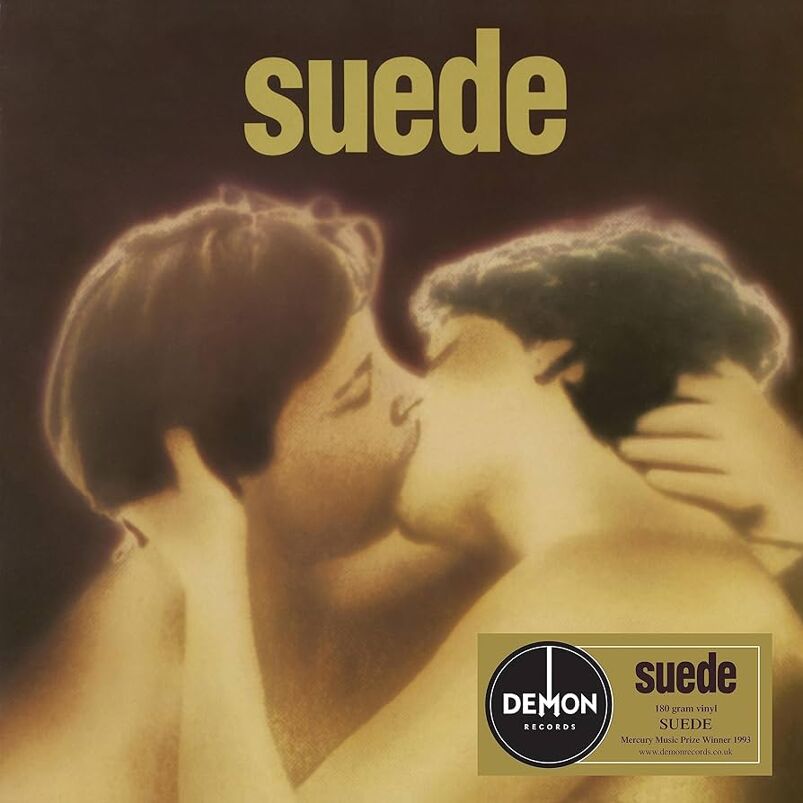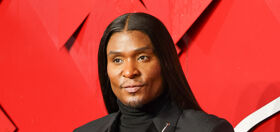
If it’s possible to identify the moment bona fide musical stars are born, Suede’s was arguably the release of “Animal Nitrate” in 1993.
It wasn’t the British band’s first release. However, it was the song that propelled them into the UK top ten, fulfilling the “next-big-thing” predictions that had built up around them. It set the groundwork for the release of their eponymous debut album, which went on to top the UK charts and be one of the fastest-selling debuts in the country’s chart history.
That “Animal Nitrate” was a song with such blatant queer overtones was as surprising as it was thrilling to many young gay listeners.
Your dose of fabulosi-TEA
Subscribe to our newsletter for your front-row seat to all things entertainment with a sprinkle of everything else queer.
Obviously, the title is a play on “Amyl Nitrate,” the drug commonly found in poppers. Lead singer Brett Anderson sings of someone being introduced to the pleasures of the flesh and yearning for more.
“Well he said he’d show you his bed, and the delights of the chemical smile, so in your broken home he broke all your bones, now you’re taking it time after time,” he wails.
Another line underscores that this is more likely about gay sex.
“What does it take to turn you on, oh? Now he has gone. Now you’re over 21, oh. Now your animal’s gone.”
At the time of the song’s release, the age of consent in England for gay sex was 21. It was lowered to 18 in 1994, and then equalized with heterosexual sex (16 years) in 2000.
Musically, the song is a rowdy marriage of glam-rock and punk that lurches and sweeps, before settling into its anthemic closing refrain: “Animal, he was animal, an animal.”
The path to fame
Suede never really broke through in the US but were huge in the UK. For some, they seemed to appear from nowhere. However, they were no overnight success.
The band first formed in 1989. Anderson and Justine Frischman were both students at University College in London. They dated and formed the band with a childhood friend of Anderson’s named Mat Osman. They then recruited a lead guitarist, Bernard Butler. They made do with a drum machine for live gigs at first, but later picked up drummer Simon Gilbert.
Gilbert is gay. In a surreal twist, Suede found him through the man who briefly managed them: Ricky Gervais.
Yes, that Ricky Gervais.
The future comic superstar had his own stab at pop stardom in Britain in the early 1980s. When that bid for pop immortality flopped, Gervais turned to events management at the University of London.
Frischman and Anderson broke up when the former began to date Blur frontman Damon Albarn. Blur were already enjoying commercial success. At first, Frischman continued in Suede but tensions quickly came to a head between her and ex-lover Anderson.
Butler later recalled, “She’d turn up late for rehearsals and say the worst thing in the world – ‘I’ve been on a Blur video shoot.’ That was when it ended, really. I think it was the day after she said that that Brett phoned me up and said, ‘I’ve kicked her out.'”
Frischman would go on to enjoy success of her own with her band, Elastica.
Live shows and a limited-release single began to generate buzz around Suede. Even before they released their official first single in 1992, the influential Melody Maker music paper put them on its front cover and called them “The best new band in Britain”.
“We kiss in his room to a popular tune…”
Suede’s sound, although borrowing from the likes of The Smiths, The Cure and the aforementioned glam and punk, set them apart at the time. The UK was emerging from its ‘Madchester’ indie-dance era. In the US, grunge was in the ascent.
Both those music genres were perceived as fairly straight. Suede, with their fondness for black leather and Anderson’s floppy-haired androgyny, offered the possibility of something else.
And then there were his lyrics.
On their first single, “The Drowners” (1992), Anderson sings, “Won’t someone give me some fun? As the skin flies all around us. We kiss in his room to a popular tune, oh, real drowners.”
The use of the “his” pronoun did not go unnoticed. Flip to the b-side, “My Insatiable One”, and Anderson is again singing of losing someone: “Oh, he is gone, he’s my insatiable one.”
Anderson was asked about this sexual ambiguity at the time and gave a quote that came to dog him, describing himself as, “a bisexual man who never had a homosexual experience.”
His answer at the time was perhaps a nod to one of his musical heroes, David Bowie, who rose to glam rock success by presenting a similarly is-he-or-isn’t-he vagueness around his sexuality. Years later, Anderson acknowledged his response had been “clunky”. He wanted to suggest a sexual fluidity, rather than label himself as “bisexual.”
Rather than getting hung up on labels, gay fans, mainly, were just happy someone was singing about man-on-man passion. The presence of an out-gay man in the band (drummer Gilbert) also helped nix accusations of queer-baiting.
The London Suede
Suede’s second single, “Metal Mickey” broke the UK top forty and was their only song to make a ripple in the US. It went to number seven on the Modern Rock/Alternative Airplay chart. The dominance of grunge at the time didn’t work in Suede’s favor in the States.
They were also forced to change their name after a lounge singer with the same moniker sued them. Afterward, in America only, they had to change their name to The London Suede.
However, the UK embraced Suede with gusto. Every magazine and newspaper wanted to feature them on the cover, and their debut album won the prestigious Mercury Music Prize. It featured a gender-ambiguous cover. The photo actually came from a 1991 book, Stolen Glances: Lesbians Take Photographs, and shows two women kissing.

Suede’s success bred tensions within the band. Guitarist Bernard Butler quit shortly before the release of their second album, Dog Man Star.
The band survived his departure. They enjoyed their greatest success with their third album, Coming Up (1996). That record, released during the heyday of “Britpop” (a musical movement Suede pioneered but were quick to distance themselves from), gave them five top ten singles in the UK charts.
Suede disbanded after the relative failure of their fifth album, A New Morning, in 2002. However, they reformed for live shows in 2010 and released a new album in 2013 (Blood Sports). They have continued to release new music since then, with their most recent album, Autofiction (2022), going to number two on the UK album charts.
Related:
How The Kinks casually made this queer rock ballad a smash hit in 1970
“Lola” remains as potent and alluring today as it did in 1970.
LISTEN: That time Green Day’s Billie Joe Armstrong came out in the most punk rock way possible
Ever before the Green Day frontman came out as bi, he said everything he needed with “Coming Clean.”




















ingyaom
One of my favorite albums … fun seeing it here.
Brett can still sing!
TimidTim
Lesbian lounge singer Suede btw, to keep things lgbt related but ok. She ruined this fun little pattern these Brit’s has going on back than too: Suede, Blur, Pulp, Ash, Gene, James, Ride, bis, Lush, Curve, Moose, Cast, Doves, Loop, Muse, Bush, even though they are frowned upon for being so Americanized. Even the Verve was initially just Verve until they also had American record label issues just like (the London) Suede.
lykeitiz
Wow – learn something new every day, even if it’s from your own past.
I used to play the hell out of that debut album, but never put 2 & 2 together with the poppers reference.
Regardless, the whole album is a gem, & should be put on the list for all music lovers.